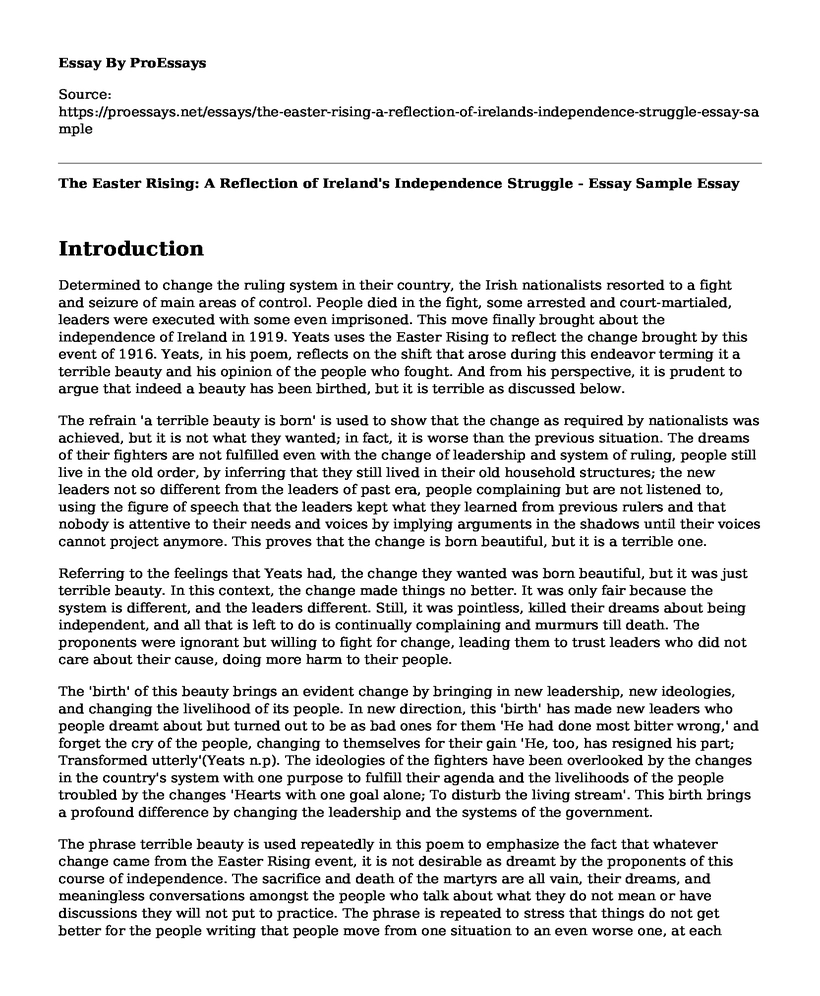Introduction
Determined to change the ruling system in their country, the Irish nationalists resorted to a fight and seizure of main areas of control. People died in the fight, some arrested and court-martialed, leaders were executed with some even imprisoned. This move finally brought about the independence of Ireland in 1919. Yeats uses the Easter Rising to reflect the change brought by this event of 1916. Yeats, in his poem, reflects on the shift that arose during this endeavor terming it a terrible beauty and his opinion of the people who fought. And from his perspective, it is prudent to argue that indeed a beauty has been birthed, but it is terrible as discussed below.
The refrain 'a terrible beauty is born' is used to show that the change as required by nationalists was achieved, but it is not what they wanted; in fact, it is worse than the previous situation. The dreams of their fighters are not fulfilled even with the change of leadership and system of ruling, people still live in the old order, by inferring that they still lived in their old household structures; the new leaders not so different from the leaders of past era, people complaining but are not listened to, using the figure of speech that the leaders kept what they learned from previous rulers and that nobody is attentive to their needs and voices by implying arguments in the shadows until their voices cannot project anymore. This proves that the change is born beautiful, but it is a terrible one.
Referring to the feelings that Yeats had, the change they wanted was born beautiful, but it was just terrible beauty. In this context, the change made things no better. It was only fair because the system is different, and the leaders different. Still, it was pointless, killed their dreams about being independent, and all that is left to do is continually complaining and murmurs till death. The proponents were ignorant but willing to fight for change, leading them to trust leaders who did not care about their cause, doing more harm to their people.
The 'birth' of this beauty brings an evident change by bringing in new leadership, new ideologies, and changing the livelihood of its people. In new direction, this 'birth' has made new leaders who people dreamt about but turned out to be as bad ones for them 'He had done most bitter wrong,' and forget the cry of the people, changing to themselves for their gain 'He, too, has resigned his part; Transformed utterly'(Yeats n.p). The ideologies of the fighters have been overlooked by the changes in the country's system with one purpose to fulfill their agenda and the livelihoods of the people troubled by the changes 'Hearts with one goal alone; To disturb the living stream'. This birth brings a profound difference by changing the leadership and the systems of the government.
The phrase terrible beauty is used repeatedly in this poem to emphasize the fact that whatever change came from the Easter Rising event, it is not desirable as dreamt by the proponents of this course of independence. The sacrifice and death of the martyrs are all vain, their dreams, and meaningless conversations amongst the people who talk about what they do not mean or have discussions they will not put to practice. The phrase is repeated to stress that things do not get better for the people writing that people move from one situation to an even worse one, at each passing moment: the unfulfilled dreams and meaningless struggle to win the war of becoming free.
The Irish Individuals needed change and thought that by ending the British rule, they would achieve it well; they got the change through their takeover in 1916. The changes they wanted, according to the poem, are still hostage to the new system. There is a feeling that those who sacrificed a lot for this to come right, always have their dreams unfulfilled, maybe in their next life 'That is Heaven's part, our part; When sleep, at last, has come' (Yeats n.p). This means that their need for change is not over yet, they got a new beautiful transformation, but it is terrible.
The Easter Rising of 1916 by the Irish was necessary for them to experience change and have their freedom. It worked; they became independent, but the changes that resulted from it were not the best they dreamt of. The politics, leadership of these people, changed with individuals caring more for their needs forgetting the struggle that their fighters had, their reasons for fighting, and the dreams they had for the changes in their country. From this discussion, it is indeed evident that the Irish change is a terrible beauty birthed.
Works Cited
Yeats, William Butler. Easter, 1916. Privately printed by Clement Shorter, 1916.
Cite this page
The Easter Rising: A Reflection of Ireland's Independence Struggle - Essay Sample. (2023, Apr 10). Retrieved from https://proessays.net/essays/the-easter-rising-a-reflection-of-irelands-independence-struggle-essay-sample
If you are the original author of this essay and no longer wish to have it published on the ProEssays website, please click below to request its removal:
- Herbert Hoover on the Great Depression - Paper Example
- Texas Governors Should Appoint State-Level Judges Essay
- Confirming Brett Kavanaugh to the Highest Court Paper Example
- Research Paper on Slavery Before and After the American Revolution
- Trump Freezing of Federal Pay Conflict Analysis
- Essay Sample on Canada's Floods: A Growing Risk and Government Responsibility
- Iraq and Syria: The Aftermath of Bush's Choices - Essay Sample







